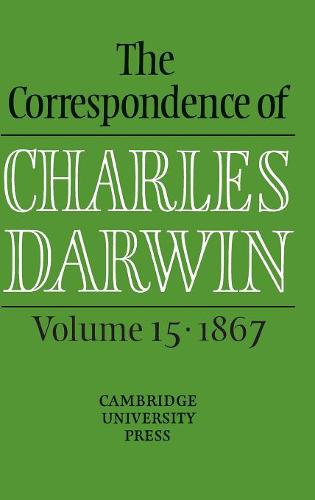
The fifteenth volume of Charles Darwin’s correspondence comprises all the surviving letters both from and to Darwin from the year 1867.
Darwin’s return to relatively good health the previous year continued through 1867. He spent a considerable time during the year correcting proofs of his two-volume The Variation of Animals and Plants under Domestication. In parallel, he also began detailed research into human evolution, sexual selection, and the expression of emotions, which would ultimately result in two more books: The Descent of Man and The Expression of the Emotions in Man and Animals.
Other highlights featuring in Darwin’s 1867 correspondence include:
- Darwin complaining in the pages of ‘Athenaeum’ magazine about British publishers’ practice of leaving books’ pages uncut;
- Darwin’s best friend, Joseph Dalton Hooker announcing mid-sentence the breaking news of his wife having just given birth, and Darwin subsequently rejoicing ‘& this not in a parenthesis , that Mrs Hooker is safe through her affair’;
- Darwin, having been provided with a list of potential human vestigial organs, suggesting a few more, and later reporting incredulously a recent religious explanation of such organs;
- Darwin’s difficulty explaining gaudy coloration in caterpillars, and Alfred Russel Wallace’s ingenious response;
- Darwin and Wallace politely disagreeing over the role (or otherwise) of sexual selection in human evolution—and in the different colouring of male and female birds in many species;
- Darwin’s views on education reform regarding (over-)emphasis on the classics;
- Darwin claiming “I do not believe any man in England naturally writes so vile a style as I do”, and opining that “A naturalist’s life wd. be a happy one, if he had only to observe & never to write.”
- Darwin (correctly) predicting his hypothesis concerning heredity, Pangenesis, “will appear bosh to all you sceptics.”
- Darwin being asked by a German correspondent to rein in his enthusiastic, outspoken disciple Ernst Haeckel, and Darwin doing so (very diplomatically);
- Darwin’s thoughts on a recent book and an article critical of his theory of evolution by means of natural selection;
- Darwin receiving an unexpected consignment of locust dung, from which he subsequently manages to germinate some grass-seeds;
- Darwin receiving (but apparently not replying to) several long, rambling letters from a well-meaning religious fundamentalist (here’s the first);
- Darwin confidently predicting “I feel no doubt that views closely akin to those which I have advocated will ultimately be universally admitted.”
As with all the volumes in this series, this book is really aimed at people with a serious interest in Charles Darwin. As with all the other volumes, every letter is annotated with meticulously researched footnotes explaining its context and references. The series as a whole is a masterpiece of scholarship.
- Buy this book from Bookshop.org (UK) and help tax-paying, independent bookshops.
- Buy this book from Amazon.co.uk
- Buy this book from Amazon.com
Leave a Reply